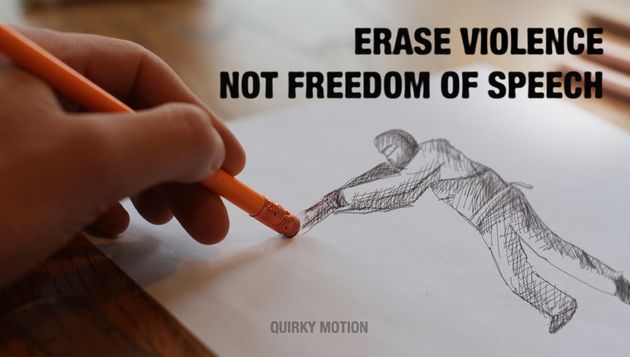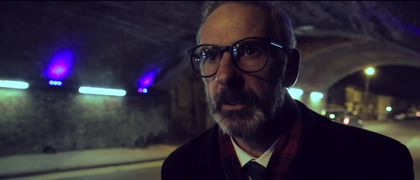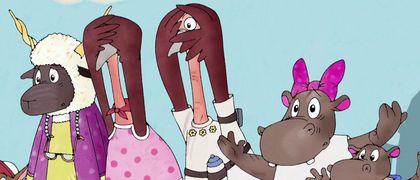“Interdependence is a Christian principle, it’s good to learn from what is happening across Europe”, says video artist John Lumgair.
 A Quirky Motion illustration.
A Quirky Motion illustration.
We live in a society where image is everything and where the audiovisual industry has grown exponentially in the last decades. Does storytelling has something to say in the way we reach others?
John Lumgair is one of the founders of Quirky Motion, a British audiovisual company which produces videos, podcasts, ads, films, animation and documentaries.
 John Lumgair , one of the original founders of Quirky Motion
John Lumgair , one of the original founders of Quirky Motion“Stories that are less true have the potential for harm, and also fail to be good artistically”, he told Evangelical Focus.
Lumgair believes that “some Christians are uncomfortable about being a minority in a strongly secular world, they attach themselves to the past and hide in the church”, and “attack the media as if its a monolithic monster, forgetting its real people trying to earn a living like everyone else.”
As Christian professionals, “whether someone is a Christian or not, we are compelled to love them, which means doing the best job we can, under the constraints we have”, he said.
Read John Lumgair´s full interview.
Question. What is Quirky motion? What kind of services do you offer?
Answer. Quirky Motion is an Animation and Film production company based in London.
We offer Animation in its various flavours, from living breathing characters to more graphical work. We even do some special effects, plus live action film. My brother who is a colleague has a background in film directing, so this is a big part of what we do.
Of course these skills can be used for a huge number of things, from entertainment to communication and much that lies between them! Sometimes we play a small part in a larger production, or do the whole thing from script to final production.
 Éluder, a Quirky Motion short film.
Éluder, a Quirky Motion short film.
Q. You work for both Christians and non-Christians clients. Is there any difference between the way you work for each of them?
A. Whoever we work for we want to do a good job. Martin Luther is reputed to have said: “The Christian shoemaker does his duty not by putting little crosses on the shoes, but by making good shoes, because God is interested in good craftsmanship.”
Whether someone is a Christian or not, we are compelled to love them, which means doing the best job we can, under the constraints we have. We often find it takes more work to help Christians understand the medium, which can be harder work, but we also find some Christians may want to commit the project in prayer, which is a joy.
Q. Most of what you do is audiovisual: videos, podcasts, ads... What are the strengths and weaknesses of this way of reaching people?
A. Visual stories are very good at reaching people, which is why big companies spend money on them. We are wired to think in stories. When we ask someone how their day was, we are asking for a story. Constructing narratives is how we make sense of the world. But it’s also dangerous, because they take such a firm hold on our imagination.
It's sobering to be reminded that stories have been used to instil and reinforce prejudice. You only have to think of the damage done by the anti-Semitic stories that went around Vienna in the 1930s.
Andrew Butler - a psychology doctoral student at Washington University - did a study on how cognitive psychology can be applied to enhance educational practice. His research showed that films stick in our head 50% more than just reading the text. But most striking when inaccurate parts of the film are corrected by the teacher, students still believe the film over the facts.
Due to the power film has over the very root of our being, we need to ask hard questions like, does it misrepresent anyone, it’s it fair, is this really how the world works. Film in its purest form is a personal view, and in many ways is about making people feel what you feel. Done well it will help you stand in someone else´s shoes, so it can really build empathy, and challenge how you view the world.
Despite its extraordinary power, film is very limited in what it can do. It stimulates deep questions, makes you feel and think, but it cannot really teach anything very solid. Plus if it's not entertaining not even your mum will watch it, and unless you are Michael Moore, you don’t get to preach.
Now we no longer need to get permission from the BBC to make stuff, but there is a reason they never commission some stuff, and its not always prejudice. Christians can often get high on the idea they now have a chance, yet don’t realise how much work and cost it really is, plus they hope to use it as a platform for propositions, which is to profoundly misunderstand the medium. There is already fantastic medium for communicating propositional truth, and that is a book.
 Quirly Motion anmation
Quirly Motion anmation
Q. What role does storytelling play now that image seems to be everything?
A. On the whole, our society has become more visually literate, and I welcome this. It enables stories to do more. But because its easier to watch than read, I fear we are also less discerning and more passive.
This places a huge responsibility on people who make films which are honest. When I say honest, I don’t mean biopics (which are never really true). I mean showing the world as it really is.
To take a theological example, all people are made in God’s image, we are more like God that anything in the universe, it's mind blowing. But we are also deeply flawed, the image is fractured, and we are all capable of the grossest evil. We must hold these truths in tension. Which will mean the “heros” are flawed and the “villains” have some level of goodness in them.
I actually think that stories that are less true, not only have the potential for harm, but also fail to be good artistically. In a culture that is `amusing itself to death´ I think we have to create work that emotionally moves, that doesn’t just leave people in suspended animation.
Q. Recently you have participated in the European Leadership Forum in Poland, where you were in contact with other European media people. Why is it important to network with other Christian media?
A. Trying to do anything without the help of others is in essence pride, and the Bible isn’t too keen on that! Of course not everyone has the privilege to come to ELF, but we should seek to connect with others as much as we can.
Interdependence is a very Christian principle. It’s good to learn from others and see what is happening across Europe, to encourage one another. So many wonderful people are doing fantastic things. I think aching big things will mean working together.
 Because, a fun animated documentary to learn how to spell!
Because, a fun animated documentary to learn how to spell!Q. How can we work together to be a light in a secularised European society?
A. If we don’t have a light shining in our own lives then we’re sunk! The next stage is how we treat others in our industry. Do we treat out freelancers with respect? Do we pay them fairly? How do we talk about our colleagues, and clients? I think we owe it to one another to challenge each other on this kind of issue. Christians must be exemplary, despite having smaller budgets.
Because of the way the secularisation is going, there are more cases of hostility to Christians. We need to be supportive of one another, because one of us will get it in the neck at some point! The love we have for one another is a key way we are a light. I’m hopeless at it, but being supportive of one another in prayer is essential, particularly as it’s easy to compromise if we don’t have support.
Sadly some Christians are uncomfortable about being a minority in a strongly secular world, they attach themselves to the past, and hide in the church. They attack the media as if its a monolithic monster, forgetting its real people, trying to earn a living like everyone else.
ELF had some fantastic lectures, dealing with a number of hot topics, helping us each other think more deeply together. A number of years ago, the British theologian John Stott talked of “double listening”, the idea of listening intently to both the Bible and the world around us, in order to relate the Bible back to the world. This is done best in discussion, particularly as we bring different European perspectives. Its out of dialogue that we may be able to get new projects off the ground.
Chamamada Ngozi Adichie in her brilliant TED talk talked about how she grew up reading kids books that were culturally alien to her world. That “the single story” is dangerous because it starts to misrepresent how the real world is. We have stories that are alternative to the mainstream, and an important voice in a pluralistic world. Being an unorthodox voice takes courage, and you feel less crazy when others are also telling stories.
Q. Is there anything else you want to add?
A. Having said all of this, you might look at our work and think this all sounds a bit grand and that we hardly match up to our ideals. An in essence, we Christians are merely anchovies in a world of whales. But in a way, if we are faithful with the small, God smiles on that.

Las opiniones vertidas por nuestros colaboradores se realizan a nivel personal, pudiendo coincidir o no con la postura de la dirección de Protestante Digital.
Si quieres comentar o